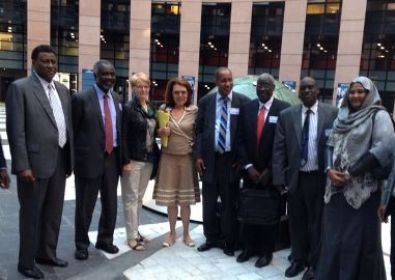Sudan opposition forces call for EU support to restore peace and democracy
July 16, 2014 (STRASBOURG, France) – Sudan’s armed and political opposition forces have urged the European Union (EU) parliament to support their demands for a genuine comprehensive political solution to bring peace and restore democracy in the country.

“The Sudanese armed and non-armed opposition parties are here today (Wednesday) with a sole message of a comprehensive peaceful settlement that leads to respect of fundamental freedoms, strict observation of human rights, equal citizenship, rule of law, accountability and genuine democratic transformation in the whole [of] Sudan,” said Girbil Ibrahim, the leader of the Justice and Equality Movement (JEM) and SRF deputy chairman for foreign affairs in a statement read on behalf of the rebel alliance and opposition forces.
Ibrahim, who led the SRF delegation, said the alliance wants the EU to work jointly with the international community to ensure humanitarian access to civilians trapped in war zones, to adopt a holistic approach for peace in Sudan and back the idea of a single mediation instead of the two existing tracks for peace in Darfur and the Two Areas.
The rebel leader further stressed the need to press Khartoum to take the necessary measures to create a conducive environment for a “genuine national constitutional dialogue”.
SRF secretary for humanitarian affairs Trayo Ahmed Ali briefed the meeting on the humanitarian situation in South Kordofan, Blue Nile and Darfur, saying the situation is worse than ever before.
The representatives of opposition political parties also expressed similar demands for an EU-led international action in favour of peace and democratic transition in Sudan.
The head of the political sector of the Unionist Movement, Mohamed Zein al-Abideen Osman, said that European countries are becoming more familiar with the situation in Sudan and are well-placed to bring peace and preserve unity in the country.
He also accused the US administration of forcing the disintegration of a formerly united Sudan, a solution that has not only failed to bring peace, but also led to further complications and conflicts in the two countries, referring to the secession of the South, which declared its independence from the north in July 2011.
The deputy president of the National Umma Party (NUP), Meriam Sadiq al-Mahdi, arrived at the end of the two-hour meeting due to logistical problems. However, she was received by the EU MPs while outlining her party’s position in favour of peaceful democratic transition in Sudan.
RESOLUTION ON MERIAM IBRAHIM
The meeting comes ahead of the adoption of a resolution by the EU parliament on the case of Meriam Yahia Ibrahim, a Sudanese mother-of-two, who was sentenced to death by hanging for refusing to renounce her religion and return to Islam. A court of appeal subsequently overturned the ruling and she is currently sheltering with her family at the US embassy in Khartoum after being detained while trying to leave Sudan with South Sudanese-issued travel documents.
The draft resolution seen by Sudan Tribune calls on the Sudanese government to undertake legal reforms in order to protect fundamental human rights and freedoms.
The text also expresses the EU’s support for an inclusive negotiated solution and backs the efforts of civil society and opposition parties to promote the peace process.
EU legislators have also demand that the EU play a leading role in pushing for a strong resolution on Sudan at the next Human rights Council session in September in order to address the serious and widespread violations of human rights that continues to occur.
During the meeting, several EU legislators expressed their dissatisfaction with the decision to abolish the position of EU special envoy to Sudan.
Mariya Gabriel, a member of the European parliament committee on political affairs, who led a team of observers to Sudan’s 2010 general elections, vowed to push for the reappointment of a new special rapporteur for human rights in Sudan, but added that EU MPs have limited powers in this respect.
EU legislators also vowed to support ongoing efforts to end conflict in Sudan, as well as support the democratic transition process in Sudan, acknowledging that South Sudan’s secession had contributed to instability in the region.
However, a legislator from the Green group, Eudith Sargentini, said the EU had limited “manoeuvring space” for any action on Sudan, saying trade regulations, development aid, and sanctions had all been tried, mostly in vain.
She called for the reinvent new tools to bring the ruling National Congress Party (NCP) to achieve peace and democratic change in Sudan.
Hala Abdel, the leader of the New Democratic Forces Movement (HAQ), Haleem, issued a statement from Khartoum reaffirming its support for the meeting with EU MPs, saying it provides an opportunity for joint action to end war and implement democratic change in Sudan.
Abdel was one of the opposition leaders invited to participate in the meeting, but was unable attend due to a visa issue.
(ST)
